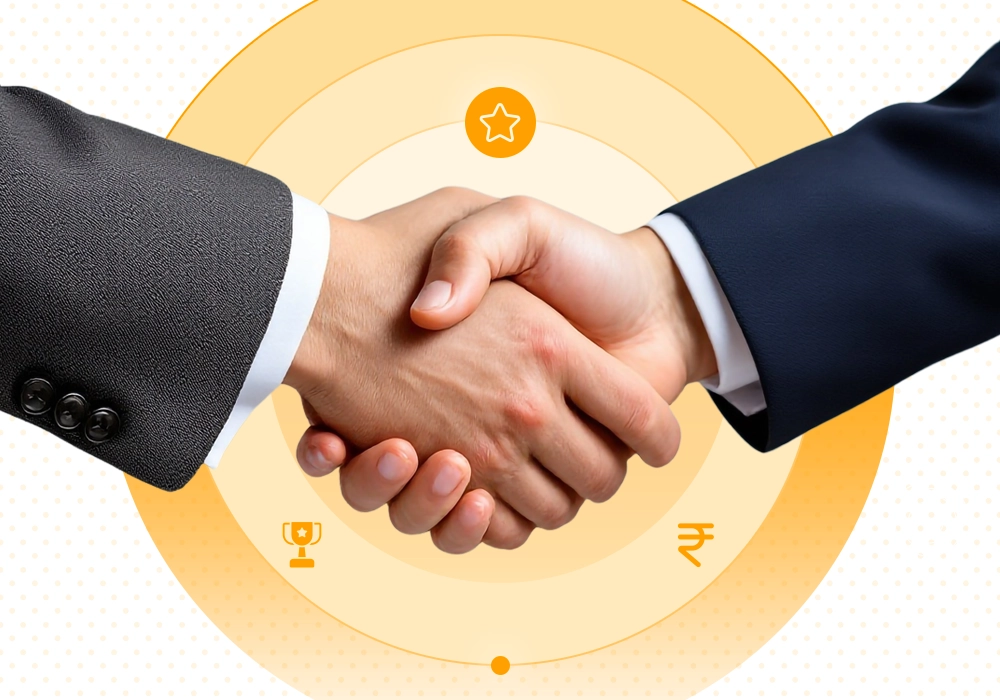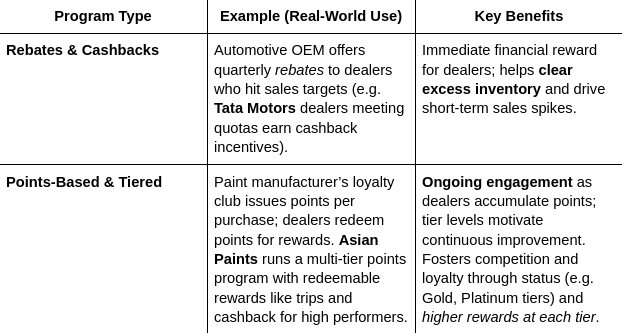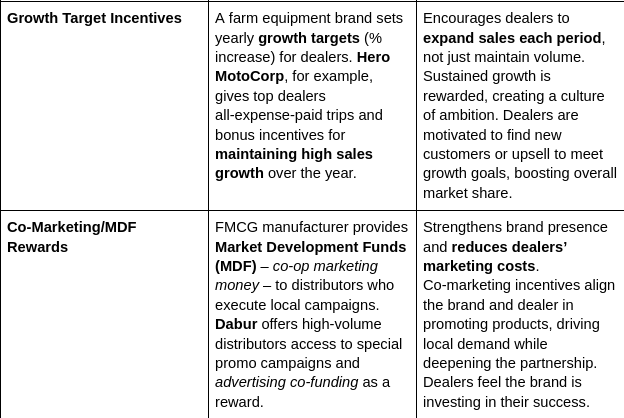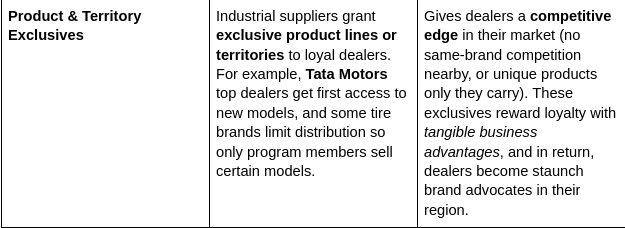
Launch a Dealer & Distributor Loyalty Program in 30 Days Using a Digital LMS
In today’s competitive B2B landscape, manufacturers and FMCG brands can no longer rely on ad-hoc incentives to keep dealers and...
Read More →
Dealers and distributors respond positively when brands recognize their contributions. A well-crafted dealer loyalty program motivates channel partners to go the extra mile.
In B2B industries, maintaining strong relationships with dealers and distributors is just as crucial as winning over end-consumers. Dealer loyalty program are structured incentive initiatives aimed at channel partners – the dealers, distributors, and resellers who sell a brand’s products – to reward their performance and foster long-term partnership.
In essence, a dealer loyalty or incentive program is a strategic tool employed by manufacturers to align dealer behavior with the brand’s goals through rewards. By offering financial incentives, exclusive perks, and other benefits, companies motivate dealers to actively promote their products, boost sales, and remain committed to the brand over competitors. The best dealer loyalty programs recognize and reward dealer efforts, turning these partners into enthusiastic “brand ambassadors” in the marketplace.
Just as retail loyalty programs turn one-time shoppers into repeat buyers, dealer loyalty programs aim to transform transactional channel relationships into collaborative, long-term alliances. Let’s explore how B2B brands build dealer loyalty, the benefits of these programs, the common types of dealer incentives, and real-world examples of successful dealer loyalty initiatives in 2025.
Dealer loyalty program (also known as dealer incentive programs) are B2B reward schemes designed to strengthen the bond between a company and its channel partners. Unlike consumer loyalty programs that target end customers, dealer programs focus on businesses in the distribution channel – think wholesalers, dealers, franchisees, and distributors.
The goal is to encourage dealers to prioritize one brand’s products over competitors’ by providing tangible rewards and recognition for performance. These programs can take many forms – from volume-based rebates and co-op marketing funds to points systems or tiered clubs – but all share a common objective: increase dealers’ commitment, sales performance, and advocacy for the brand.
Why invest in a dealer loyalty program? In today’s competitive climate, dealers often have choices about which brands to push or shelf space to allocate. A well-crafted loyalty program gives them compelling reasons to choose your products consistently. Structured incentives can drive a 15% initial increase in dealer performance and even bump up sales by 44% when rolled out effectively.
Perhaps more importantly, 81% of channel partners say the opportunity to earn rewards from manufacturers strengthens their relationship with those brands. In short, dealer loyalty programs are about creating a win-win partnership: dealers get extra value and support for hitting goals, and manufacturers secure more dedicated, motivated sales partners.
Designing a dealer loyalty program requires more than just handing out discounts. Leading B2B brands take a holistic approach to keep their dealers engaged, motivated, and loyal. Here are key strategies used to build dealer and distributor loyalty:
No two dealers are the same – and a one-size-fits-all approach often falls flat. Successful programs use personalization to tailor incentives and communications to different dealer segments. This might mean setting different targets for a rural distributor vs. an urban mega-dealer, or offering rewards that match a partner’s specific interests and needs. Personalizing the experience shows dealers that the brand understands and values their unique business, much like how modern loyalty leaders customize consumer offers.
Tactics include individualized goal setting, celebrating each dealer’s milestones (anniversaries, sales achievements) and sending tailored rewards or recognition. Such personalized engagement strengthens emotional connections – for example, celebrating a dealer’s achievement with a special award or event can deepen loyalty. The more relevant and custom-fit the program is to a dealer’s reality, the more likely they are to engage enthusiastically.
Top brands build loyalty by directly linking rewards to dealer performance. In practice, this means setting clear metrics (sales volume, growth percentage, customer service scores, etc.) and rewarding dealers for hitting or exceeding targets. Performance-based incentives might include volume rebates, bonus payouts, or public recognition for high achievers.
For instance, Tata Motors rewards its dealerships based on various metrics – dealers who meet vehicle sales and service quality targets receive cashback incentives and other perks. This approach creates a meritocratic environment that motivates dealers to compete in a healthy way. When dealers know that more sales and better service will earn them greater rewards, they are naturally driven to invest more effort in promoting the brand. As one industry example noted, performance-based incentives clearly drive higher dealer motivation.
The key is to align the incentive structure with business goals so that both the dealer and the brand win with every extra sale.
Building loyalty isn’t only about monetary rewards – it’s also about helping dealers succeed. B2B brands often provide extensive support, education, and training as part of their loyalty strategy. Well-trained dealers can sell more effectively, which benefits everyone. For example, offering product training sessions, certifications, and on-site support gives dealers the knowledge and confidence to push the brand’s products.
Many successful programs include a dedicated dealer portal with sales materials, troubleshooting guides, and even on-demand training videos. Tata Motors, for instance, includes training programs in its dealer incentive program to improve customer interactions and after-sales service quality, ensuring long-term engagement. Similarly, Hercules Tires’ dealer program gives partners access to “Hercules University” for product knowledge and sales skills development.
By investing in dealer capabilities, a brand shows it is committed to dealers’ business growth, not just its own sales – fostering a sense of partnership. This support can extend to marketing assistance (co-branded advertising materials, lead generation campaigns) and even tools like sales management software. When dealers feel supported to grow, their loyalty to the brand deepens.
Everyone loves to feel valued. In B2B channels, exclusive benefits and recognition for top dealers go a long way in building loyalty. Brands often create tiered programs where high-performing dealers attain a special status (Gold, Platinum, etc.) and enjoy privileges unavailable to others.
These exclusive perks might include first access to new products, extra margin opportunities, extended credit lines, or even territory protection. For example, Tata Motors’ best dealers gain exclusive access to new vehicle models before others, which both rewards them and helps them attract customers Hero MotoCorp gives top dealers limited-edition models and all-expenses-paid trips as special rewards. Such benefits make dealers feel like an elite part of the brand’s family, which increases their pride and preference for the brand.
Public recognition is another powerful tool – many companies hold annual dealer award ceremonies or trips where top performers are celebrated on stage. This not only motivates the awarded dealers to remain loyal, but also encourages others to strive for that recognition. Exclusive clubs, VIP events, and recognition plaques may seem small, but they fulfill a dealer’s desire for appreciation and status, translating into stronger loyalty.
Modern dealer loyalty programs are increasingly data-driven. B2B brands build loyalty by leveraging data to refine incentives and keep dealers engaged. Integrating the loyalty program with CRM and sales systems allows real-time tracking of dealer performance, preferences, and redemption patterns. This data is a goldmine: it helps manufacturers identify which rewards resonate most, which dealers are at risk of disengaging, and where new opportunities lie.
For instance, analytics might reveal that one distributor excels in selling product A but under-indexes in product B – opening a chance to motivate growth in that area with targeted rewards. With integrated data, communication to dealers can also be personalized (as in point #1), sending the right message at the right time. Additionally, seamless CRM integration makes the program easy to use and transparent for dealers, boosting trust.
Advanced B2B loyalty platforms often come with built-in CRM connectivity and dashboards – so both the brand and the dealer can see progress and points in real time. According to industry research, 79% of businesses using analytics from loyalty platforms see significant operational improvements. By using data intelligently – forecasting demand, identifying trends, and tailoring incentives – companies keep their dealer programs fresh and impactful. In short, data integration turns a loyalty program from a static scheme into a dynamic, continuously improving experience.
Tiered programs are a staple in loyalty, and they work wonders in a dealer context by encouraging continuous growth. B2B brands often structure their programs in tiers (levels) where each tier unlocks bigger rewards and status. Growth-based incentives tie rewards not just to absolute performance, but to how much a dealer grows their business with the brand over time. For example, a manufacturer might have Silver, Gold, and Platinum dealer levels – with Platinum dealers getting the richest benefits (higher rebate percentages, priority treatment, etc.).
To climb tiers, dealers must meet rising sales or growth targets, creating a game-like progression that keeps them striving. Multi-tiered reward structures have been shown to drive higher engagement, as seen in Asian Paints’ dealer club which offers escalating rewards including points, cashback, and even international trips for top-tier dealers. Another example is UltraTech Cement’s program, which has tier-based rewards where top-performing dealers receive priority delivery, extended credit, and even business development grants – tangible benefits that incentivize dealers to reach the next tier.
The tiered approach not only motivates growth but also segments the dealer base, allowing tailored strategies for each level. Importantly, even entry-level tiers should be attainable and rewarding, to encourage new or smaller partners to participate and aspire upward. By providing a growth roadmap, tiered incentives turn loyalty into a journey – one that aligns a dealer’s expansion ambitions with the brand’s success.
A well-implemented dealer loyalty program delivers significant advantages to a brand’s channel strategy. Here are some major benefits B2B companies reap from dealer loyalty initiatives:
Dealer loyalty programs directly impact the stability and productivity of your channel. Retention of good channel partners improves because dealers have concrete reasons to stick with your brand – they don’t want to lose the accrued rewards, status, or future incentives by switching to a competitor. High dealer churn can destabilize distribution, so reducing that churn is key. Studies show that businesses with dealer loyalty programs reduce partner churn rates by up to 18%, meaning more of your dealers stay loyal year after year.
This continuity in the channel translates to consistent sales and better market coverage. At the same time, loyalty programs turbocharge performance: motivated dealers sell more. Incentivized dealers often go beyond their usual effort – for instance, incentive programs have been linked to a 15% bump in dealer performance and a 44% increase in sales in some cases. The combination of retaining your best dealers and encouraging them to maximize sales results in a significant uplift to revenue. In short, a dealer loyalty program creates an engaged network of partners that sell harder and stay longer.
Another benefit of dealer loyalty programs is the rich data and predictability they bring to the supply chain. Every reward point issued, every goal set, and every redemption made is a data point that helps you understand dealer behavior and product movement. Over time, this leads to more accurate forecasting and demand planning. For example, if dealers are incentivized via the program to push certain products, you’ll get clearer early signals of upticks in demand. In fact, loyalty program data can help companies identify trends and predict future demand, ensuring optimal stock levels and reduced wastage.
By analyzing participation and achievement rates, brands can forecast how much product a “Gold” tier dealer might move next quarter, or which regions might need extra inventory due to an ongoing promotion. Additionally, dealers involved in a loyalty program are more likely to share sales data and market feedback (since they’re in regular communication about the program), further improving the accuracy of forecasts.
All this means fewer stockouts or overstocks and a more efficient supply chain. Real-time analytics from loyalty platforms also allow companies to respond quickly to market changes. In essence, a dealer loyalty program not only drives sales but also acts as an information network that sharpens your operational planning.
In many industries, having a strong dealer loyalty program can become a differentiator that sets a brand apart from competitors. If your dealers are happier, better rewarded, and more engaged than those of your competitors, they will naturally push your products more. This results in greater market share and mindshare at the distributor and retailer level – an often under-appreciated battleground. A robust loyalty initiative gives your channel partners reasons to favor you even if a competitor offers slightly cheaper pricing, because the overall value they get from your brand (through incentives, support, and partnership) is higher. Companies that effectively use loyalty programs thus build a competitive edge with a best-in-class network of partners.
Moreover, loyalty programs can be tailored to emphasize selling points that distinguish your brand – for example, incentivizing dealers on service quality creates a reputation that your dealer network offers superior customer experiences. Many manufacturers also use loyalty schemes to secure dealer exclusivity in territories (dealers commit to selling only that brand in exchange for special rewards), which directly shuts out competition.
Finally, from a perception standpoint, being known as a manufacturer that “takes care of its dealers” enhances your attractiveness in the channel. It helps attract the best new dealers to join you (because they hear about how rewarding your program is), further reinforcing your market coverage. All told, a well-run dealer loyalty program becomes a strategic moat that competitors will struggle to overcome.
Perhaps the most profound benefit is the strengthening of the relationship between your company and the dealers/distributors. A loyalty program, at its heart, is about building a partnership rather than a mere transactional arrangement. Through regular interactions (program communications, training sessions, reward events) and mutual wins (dealer sells more, brand rewards more), the trust and goodwill between manufacturer and dealer deepen.
According to a Statista survey, 67% of businesses with channel loyalty platforms reported improved relationships with their partners. Dealers start to feel like they are an extension of the company’s team – and in many ways, they are. This can translate to intangible yet invaluable benefits: dealers might share customer feedback more openly, collaborate on local marketing, or give early heads-up on market shifts, because they see the brand manufacturer as a true ally in their business.
Over time, loyalty breeds advocacy – loyal dealers will not only push your products, they’ll also defend your brand, participate in case studies, and refer other partners. Strong relationships forged by loyalty programs also make tough times (such as economic downturns or supply issues) easier to navigate, because there’s a reservoir of trust and reciprocity to draw on. In summary, dealer loyalty programs help transform the manufacturer-dealer relationship from a purely financial transaction into a partnership built on mutual growth and respect, which is a foundation for long-term success.
B2B loyalty schemes for channel partners can be structured in various ways. Many programs combine multiple elements, but it’s useful to understand the common types of dealer loyalty programs, each with its own approach and benefits. The table below summarizes key program types, along with examples and what they offer dealers:



Every program type can be mixed-and-matched. For instance, a loyalty program might offer points and have tiers (combining the first two types), or provide rebates while also funding co-op ads. The best structure depends on the industry dynamics and what motivates the target dealers. The common thread is that the program should align dealer incentives with the company’s sales objectives – when the dealer wins, the brand should win too.
To see these concepts in action, let’s look at some exemplary dealer loyalty initiatives in 2025 across different industries. Each illustrates how B2B brands are innovating to keep their channel partners engaged and loyal:
Industry Context: Orange Pet Nutrition is a leading pet food and supplies distributor in India, catering to pet shops, veterinarians, and breeders. To strengthen its channel relationships, Orange Pet launched a multi-tier loyalty initiative targeting its breeder partners and retail outlets.
How Orange Pet Uses Basiq360: With Basiq360 as the backbone, Orange Pet rolled out a branded loyalty app where partners earn points on product purchases and engagements. They take advantage of Basiq360’s QR code-based points system, allowing breeders and store owners to scan product QR codes or invoices to instantly accumulate reward points.
The platform supports invoicing-based point transfers, meaning when a distributor sells to a retailer, the invoice data automatically credits loyalty points to the retailer – streamlining the entire reward process Orange Pet configures personalized schemes (for example, bonus points on new product lines or quarterly purchase targets) all through Basiq360’s central dashboard. Program performance is monitored in real time, so the company can quickly see which promotions work and adjust on the fly Notably, Basiq360’s flexibility let Orange Pet run parallel loyalty programs for different stakeholder groups (breeders vs. pet shop retailers) within one system, each with tailored rewards and tiers.
Key Benefits Observed:
Industry Context: Jewell Paints, a premium decorative coatings brand (part of Ozell Cooner Paints), competes in an industry where influencer loyalty is key. Painters and contractors often decide which paint gets used, so Jewell developed “Jewell ke Sitare,” a loyalty program to reward not only its dealers but also the painters and paint contractors who use its products.
How Jewell Paints Uses Basiq360: Jewell’s program is powered by Basiq360 and exemplifies a tiered, multi-stakeholder approach. The company distributes unique QR-coded coupons with its paint products. When a painter or contractor uses Jewell Paints, they receive a coupon; the associated dealer can then scan the painter’s coupon via the Jewell ke Sitare app to credit points to that painter’s account.
This creates a win-win: painters earn points for loyalty, and dealers log those transactions in real time. Painters accumulate points which are redeemable directly as cash transfers to their bank accounts – an efficient payout integration that Basiq360 supports. Dealers, on the other hand, use the app to manage their network of painters and view their own performance incentives.
The app also doubles as a communication tool: Jewell can instantly notify all users about new product launches, special bonus schemes, or promotions right within the app. All data flows into Basiq360’s dashboard, giving Jewell Paints visibility into painter engagement and dealer-level sales uplift.
Key Benefits Observed:
Industry Context: Gravity Bath is a growing manufacturer of bathroom fittings and accessories. In a sector where channel partners have many brands to choose from, Gravity Bath needed a way to reward loyalty and increase mindshare among its network of distributors and dealers.
How Gravity Bath Uses Basiq360: Gravity Bath leveraged Basiq360 to launch a fully branded dealer loyalty mobile app, ensuring its program is accessible anytime and easy to use. Upon enrolling, each dealer is placed into a tier (e.g. Silver, Gold, Platinum) based on their purchase volume – a structure that Basiq360 supports out-of-the-box. Dealers earn reward points for every purchase of Gravity Bath products, which they can record by simply scanning product QR codes or uploading invoice details through the app.
This scan-and-earn system makes point collection effortless and accurate, eliminating any tedious paperwork. Gravity Bath’s marketing team configures various incentive schemes on Basiq360: for instance, bonus points for hitting quarterly sales targets, extra rewards on specific product lines, and gamified challenges like a month-long sales contest with leaderboard badges. The Basiq360 platform’s flexibility allows the company to tailor these programs as needed – building sophisticated tiered structures and adding gamified elements (badges, “spin-to-win” mini games, etc.) to keep dealers motivated.
Crucially, all dealer activity and redemptions are tracked in real time. Gravity Bath’s managers can view detailed reports on which dealers are nearing their targets or which regions are performing best, thanks to Basiq360’s analytics.
Key Benefits Observed:
Industry Context: Microtek, a renowned power solutions company (known for UPS, inverters, and batteries), operates through a vast network of distributors, retailers, and electricians. By 2025, Microtek sought to modernize its channel management by blending day-to-day business operations with a loyalty program to incentivize partners.
How Microtek Uses Basiq360: Microtek deployed “Microtek Partner,” a Basiq360-driven distributor management system (DMS) that also encompasses a full loyalty rewards program. This integrated app serves multiple user roles – distributors, dealers, and even electrician partners – with tailored features for each.
Through the app, distributors can place orders, view real-time stock levels, and download account statements, while also tracking the loyalty points accrued on those sales. Retailers (dealers) use the same app to order products from their distributors and earn points for hitting sales milestones or participating in promotional schemes. Microtek even engages electricians by allowing them to register product installations or warranty activations via the app, rewarding them for influencing end-customer choices (for example, an electrician gets points for recommending a Microtek inverter). Basiq360’s platform handles the complexity behind the scenes – validating sales, awarding points, and updating leaderboards instantly.
The app sends out push notifications about new “secondary schemes” (sell-out incentives) and target-based bonuses, ensuring all partners are aware of opportunities to earn extra rewards. By consolidating order management and loyalty in one system, Microtek’s entire channel operation is streamlined. Every transaction or invoice can trigger a loyalty event (e.g., points or cashback), and claims are processed quickly. Basiq360’s automation (such as scanning invoices or warranty QR codes for points) reduces manual effort and errors in managing these incentives, which is a huge relief for Microtek’s sales team.
Key Benefits Observed:
Industry Context: Okaya is a major battery and energy storage company with a nationwide dealer-distributor network. To spur growth and outshine competitors in the battery market, Okaya introduced the “Okaya Rewards Program” for its channel partners, enabled by the Basiq360 platform.
How Okaya Uses Basiq360: Okaya’s loyalty program is delivered via a Basiq360-powered mobile app designed for both dealers and distributors. The program tightly integrates incentive rewards with everyday sales processes. For example, a dealer selling an Okaya battery to a customer can instantly earn points by scanning the product’s QR code or barcode using the app. Each sale recorded through the app adds to the dealer’s points balance in real time.
Basiq360 supports a variety of reward triggers, so Okaya runs multiple concurrent schemes – from ongoing points per product, to limited-time bonus campaigns (e.g. double points on new product launches), to performance-based incentives where reaching a quarterly sales target yields a cashback reward. The Okaya app also includes built-in e-commerce and financing tools: dealers can place orders for inventory restock directly through the app and even explore financing options for large purchases.
This means the loyalty program isn’t siloed; it’s part of an all-in-one dealer portal. Distributors, on their side, have a special login that lets them track the performance of each dealer under them, manage stock levels, and view incoming orders. They can see which dealers are close to achieving incentive thresholds and can proactively support them (for instance, by ensuring stock availability).
Okaya’s marketing team uses the Basiq360 dashboard to configure exclusive promotions for distributors as well, ensuring even the wholesalers are motivated with their own set of rewards. Thanks to real-time tracking and instant notifications, every participant is aware of their points tally and the latest schemes, creating a highly responsive and engaging program.
Key Benefits Observed:
Dealer and distributor loyalty programs have become an essential strategy for B2B brands looking to strengthen their channel partnerships. A well-executed program can boost sales performance, improve partner retention, and create a competitive advantage in the market. The key takeaways for building a successful dealer loyalty program include:
In 2025’s fast-evolving B2B landscape, dealer loyalty programs are no longer a “nice to have” but a competitive necessity. Manufacturers that successfully implement these programs enjoy stronger channel relationships, more predictable sales, and passionate dealers who advocate for their brand. By combining smart incentive design with the right technology and genuine relationship-building, B2B brands can turn their dealer networks into a powerful engine for growth. It’s about creating a win-win ecosystem – when your dealers succeed and feel rewarded, your brand succeeds right alongside them.